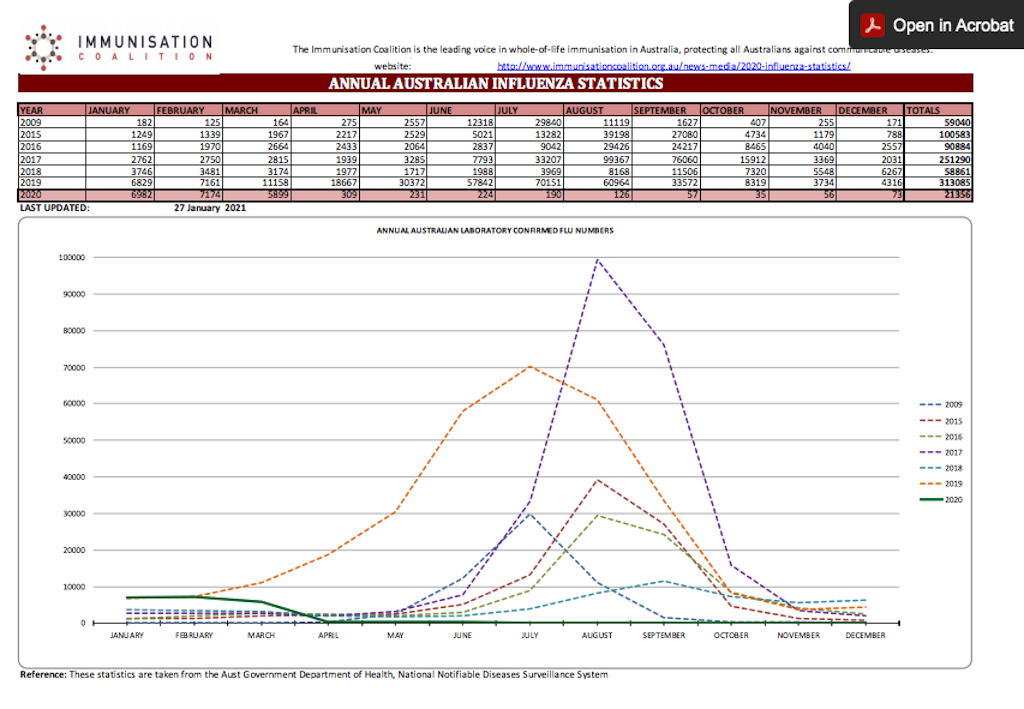COVID-19 measures stops flu season in its tracks
Australia’s influenza numbers plummeted in 2020 following the announcement of the COVID-19 pandemic, resulting in very low numbers of flu circulating around and so far it looks like 2021 will be similarly low.
![<p>The Immunisation Coalition expected 2020 to be another bad influenza year, however, the drop in influenza cases in March happened after the Government implemented COVID-19 measures. [Source: iStock]</p>](https://agedcareguide-assets.imgix.net/news/articles/Flu-season-plummets-19_3_2021.jpg?fm=pjpg&format=auto&w=550&q=65)
The Immunisation Coalition expected 2020 to be another bad influenza year, however, the drop in influenza cases in March happened after the Government implemented COVID-19 measures. [Source: iStock]
Immunisation peak body, the Immunisation Coalition, released a chart showcasing the huge difference in flu numbers over the last year, with March 2020 dramatically dropping to under 400 influenza cases within a month.
Kim Sampson, Chief Executive Officer (CEO) of the Immunisation Coalition, says that if the pandemic wasn’t a factor, the drop in flu numbers would have been completely abnormal behaviour and we would have been gearing up for another big flu season.
“It’s the action that we took to prevent transmission of COVID that affected it, it wasn’t COVID itself, it was the action we took to stop transmission,” explains Mr Sampson.
“We saw a drop off in other communicable diseases as well, it wasn’t just flu that dropped away, it was others. But the flu was the big one because we were expecting a big year again and it just didn’t come to be.”
In 2019, the Immunisation Coalition had estimated that 4,000 people were likely to die from the flu. While the real number of deaths wasn’t as high as their estimation, there were over 300,000 cases of flu in Australia.
The Department of Health Influenza Summary found the 2019 flu season as the second worst flu season on record.
In 2020, the Immunisation Coalition expected it to be another bad year for influenza, however, the results of influenza come March dropped off once the Government started to implement measures to stop the spread of the COVID-19 virus.
Around 18 million influenza vaccines were distributed in 2020, with around about the 17 million mark ending up in the arms of Australians. Mr Sampson says the vaccine likely only assisted with keeping influenza at bay and the true hero of the low numbers was COVID-19 restrictions.
Mr Sampson says, “So as soon as the pandemic was declared and that Australia was going to take action – social distancing, hand hygiene and wearing masks had a dramatic effect.
“… What [COVID-19] demonstrated to us was if we practice these good habits we can actually control many of the respiratory diseases that circulate.”
There were 36 recorded cases of influenza related deaths in Australia between January and June 2020.
Moving into 2021, the numbers for influenza are still very low, however, that could change if people aren’t careful after they get the COVID-19 vaccine.
“What may happen as people are vaccinated against COVID, they will become more complacent about influenza and there is a possibility, therefore, that we would see the flu numbers start to increase,” says Mr Sampson.
“As people stop social distancing, they drop their mask, and go back to old bad habits, we may see the flu numbers increase as the year progresses. But right at the moment, you would think that given that it will take a full year for the vaccine to be distributed and put into people’s arms, I would say it’s unlikely to see a big increase in flu numbers this year.”
Mr Sampson explains that something really interesting about influenza patterns in Australia is normally after a low flu count year, the next year will generally be a ‘rebound year’ with higher numbers.

This has been seen in 2016, which was a low influenza year, and then the following year, 2017 was one of Australia’s worst flu years. Similarly, in 2018, the flu season was quite small, and then 2019 was the rebound year which had quite dramatic numbers.
However, following a nearly non-existent 2020 flu season, normally, Australia would be preparing for a huge flu season.
“But [these] are not normal conditions. I think the reason we have not had a rebound year is because we are still complying to COVID restrictions and that is containing the flu outbreak,” says Mr Sampson.
Even though the vaccine for COVID will be distributed over the coming year, Mr Sampson wants to remind people that getting a vaccine, for COVID or influenza, is never the ‘silver bullet’ that will fix everything.
While it is a part of the tools and weapons to fight these types of diseases, the Immunisation Coalition’s data has shown that they saw a ‘dramatic drop from the minute social distancing was implemented’.
“I know for a large part of the population, they are very much aware of what has happened because of the actions taken to prevent COVID. But I am not convinced people are going to remember for a long time,” says Mr Sampson.
“I really do hope that the majority of Australians look at this and say, this has been a huge lesson and we all have something really valuable to learn about this. I mean, I have been a year without a cold, and that is rare. I am sure there are many other people that are saying the same thing.
“… All of these kinds of things are a pattern of behaviour we should all adopt – vaccination, good hand hygiene, social distancing.”
Mr Sampson also wants to remind people that they should still get the influenza vaccine even if they have already received the COVID-19 vaccine.
To view statistics on the influenza activity so far or for historic information on influenza in Australia, head to the Immunisation Coalition website.











![The new Aged Care Act exposure draft is slated for release in December of 2023, but advocates hope to see it rolled out on January 1, 2024. [Source: Shutterstock]](https://agedcareguide-assets.imgix.net/news/articles/wp/agedcareact__0811.jpg?fm=pjpg&w=520&format=auto&q=65)












Comments